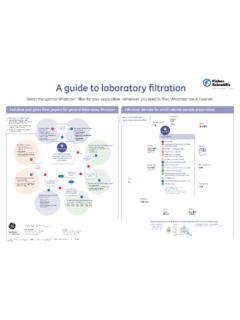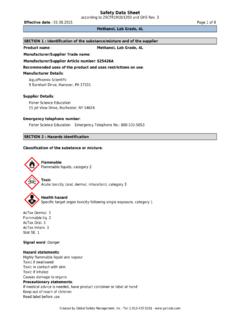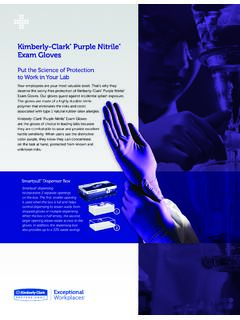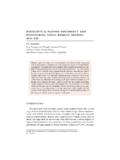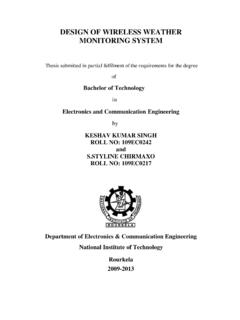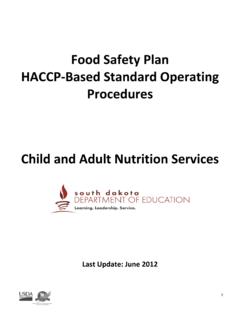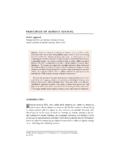Transcription of The Importance of Temperature Monitoring in your Lab
1 1 Proprietary & Confidential The world leader in serving science Proprietary & Confidential Aaron Judice Technical Manager Control Company January 2016 The Importance of Temperature Monitoring in your Lab 2 Proprietary & Confidential Agenda Temperature Measurement Critical to Laboratory Processes Topics: Effects in laboratory Temperature measurement Importance Drive to accurate and reliable Temperature measurement results Temperature measurement technologies Consistency and Reliability calibrated and accredited measurement Measurement to Monitoring oPut down the pen - let technology record oWireless technology and remote notification Listen to the replay HERE 3 Proprietary & Confidential What Does Temperature effect in the lab?
2 Temperature is one of the most universally impactful parameters in the laboratory. Among other things, it can significantly influence: Test results Effectiveness & stability Shelf life & Efficacy Accuracy & Precision 4 Proprietary & Confidential How important is Temperature Monitoring ? The CDC estimates that more than 48 million people in the US suffer from food-borne illness each year resulting in annual health-related costs of $77 billion Food Safety Lessons Learned in 2015 ..eliminating cross contamination and Monitoring the food s Temperature play vital roles in pathogen reduction Source - 5 Proprietary & Confidential How important is Temperature Monitoring ?
3 Spine and skull fragments of patients were stored in a bone freezer at a hospital in to react to the Temperature alarm caused the fragments to spoil and become useless. 6 Proprietary & Confidential How important is Temperature Monitoring ? Refrigerator Failure Renders Vaccine Ineffective Source - The CDC notes that the improper storage and handling of vaccines can cost small clinics thousands of dollars each year. 7 Proprietary & Confidential Common agencies/guidelines driving use of calibrated instruments Some other accreditation/certification programs CLIA Clinical Laboratory Improvement Amendment JCAHO Joint Commission on Accreditation of Healthcare Organizations CAP College of American Pathologists.
4 USP FDA ISO 8 Proprietary & Confidential Temperature is one of the most important conditions to equipment, a Monitoring device, a Temperature data logger, or other such device that is suitable for its intended purpose should be Electronic Temperature monitors should be calibrated to National Institute of Standards and Technology (NIST).. USP 1079 Critical to drug manufacturers, shipping companies and warehouses storing Pharmacopeial products The Drive - USP Requirement For Calibrated Temperature Measurement Instrument 9 Proprietary & Confidential USP 1118 Important to all companies audited by the FDA The Drive - USP Requirement For Calibrated Temperature Measurement Instrument Measurement Accuracy For Temperature and humidity Monitoring devices, measurement accuracy refers to the closeness of the value obtained with a particular device to the true value being measured.
5 In practice, this is determined by comparison with a device that has been calibrated against a standard that is obtained from or traceable to the National Institute of Standards and Technology (NIST). 10 Proprietary & Confidential Industries following FDA requirements include pharmaceutical, dietary supplements, nutraceutical and food companies All FDA requirements can be found in the Code of Federal Regulations (CFR) Details the requirements for establishing and maintaining calibration standards, records and controls for measurement and test equipment The Drive - FDA Requirement For Calibrated Temperature Measurement Instrument Specific areas that address calibration requirements include 21 CFR.
6 Part 58 Good laboratory practice for nonclinical lab studies Part 110 Current good manufacturing practice (cGMP) in manufacturing, packing or holding human food equipment and utensil maintenance Part 211 cGMP for finished pharmaceuticals Part 606 cGMP for blood and components Part 820 cGMP that governs methods used in and the facilities and controls used for design, manufacture, packaging, labeling, storage, installation and services of all finished devices intended for human use 11 Proprietary & Confidential The Drive - FDA Warning Letter Non-Compliance for Calibrated Thermometers 12 Proprietary & Confidential Sources - International Organization for Standardization, ISO 9001:2008 Quality management system Requirements International Organization for Standardization, ISO 13485.
7 2003 Quality management systems Requirements for regulatory purposes The Drive - ISO 9001 Clause Control of Monitoring and measuring equipment Manufacturing, service and distribution companies accredited to ISO 9001:2008 Standardization for same requirements between ISO 9001:2008 and 13485:2003 13 Proprietary & Confidential The Drive Accreditation and Certification Accreditation and ISO certification: do they explain differences in quality management in European hospitals? Abstract BACKGROUND: Hospital accreditation and International Standardization Organization (ISO) certification offer alternative mechanisms for improving safety and quality, or as a mark of achievement.
8 There is little published evidence on their relative merits. OBJECTIVE: To identify systematic differences in quality management between hospitals that were accredited, or certificated, or neither. Research design ANALYSIS: of compliance with measures of quality in 89 hospitals in six countries, as assessed by external auditors using a standardized tool, as part of the EC-funded METHODS: of Assessing Response to Quality Improvement Strategies project. MAIN OUTCOME MEASURES: Compliance scores in six dimensions of each hospital-grouped according to the achievement of accreditation, certification or neither.
9 RESULTS: Of the 89 hospitals selected for external audit, 34 were accredited (without ISO certification), 10 were certificated under ISO 9001 (without accreditation) and 27 had neither accreditation nor certification. Overall percentage scores for 229 criteria of quality and safety were , and , respectively. Analysis confirmed statistically significant differences comparing mean scores by the type of external assessment (accreditation, certification or neither); however, it did not substantially differentiate between accreditation and certification only. Some of these associations with external assessments were confounded by the country in which the sample hospitals were located.
10 CONCLUSIONS: It appears that quality and safety structures and procedures are more evident in hospitals with either the type of external assessment and suggest that some differences exist between accredited versus certified hospitals. Interpretation of these results, however, is limited by the sample size and confounded by variations in the application of accreditation and certification within and between countries. Int J Qual Health Care. 2010 Dec;22(6):445-51. doi: Epub 2010 Oct 8. 14 Proprietary & Confidential Any work environment held to standards should use individually calibrated measurement instruments for all process variables ISO cGMP Laboratories maintaining accreditation or certification programs Regulated/audited operation or process FDA/USP/USDA/JCAHO/CLIA/CAP Most all guidelines of these standards call for Individually Serialized, Calibrated and Certified test and measurement instruments.




